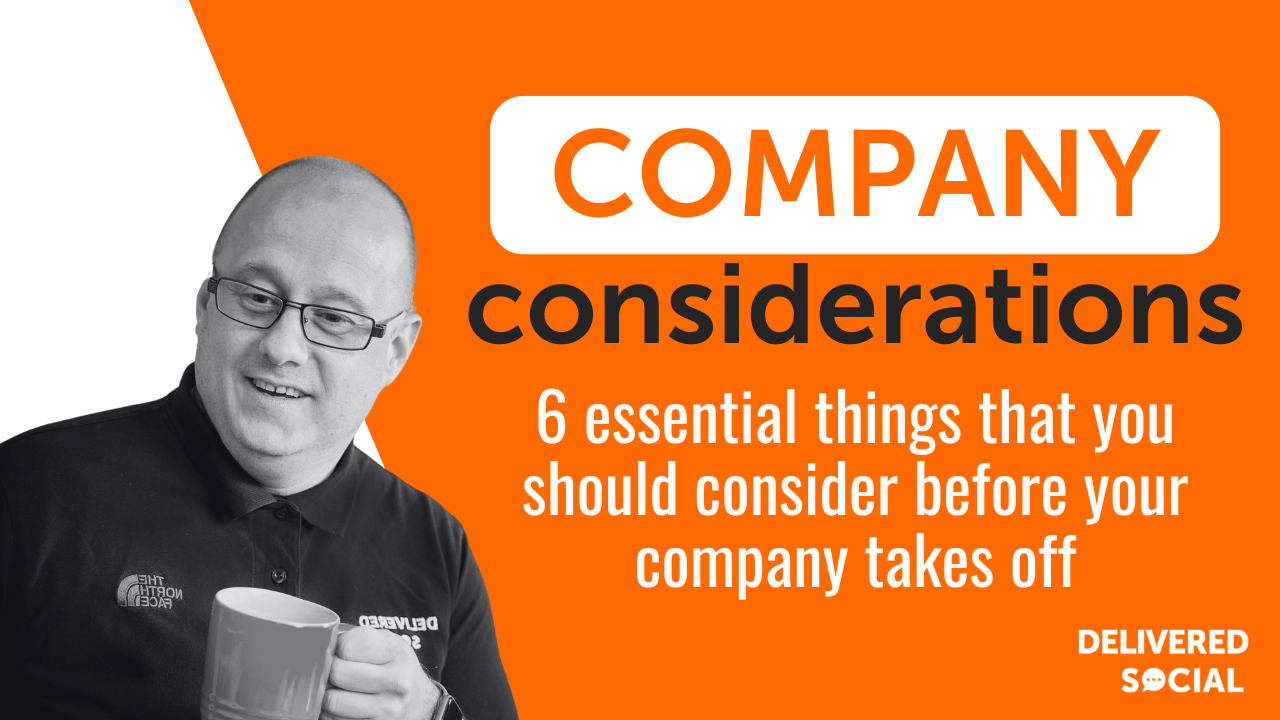
So the post has arrived, and your hands now hold the confirmation letter that you own your limited company.
Firstly congratulations!
Are you wondering what that feeling is? It’s you filled with happy, nervous energy as you look at the document, knowing that the sky’s the limit. With a new company, things to consider quickly mount up.
Here are six things you should consider doing with your new company.
1. With a new company, things to consider include a business plan
When starting a new company, where would you be without a well-thought-out plan to take your business to new heights? No doubt you’ve got some ideas on what you’d like to do, but it’s always a good idea to sit down and structure the next three, six and twelve months.
Dividing your marketing plan into sections, including competitor analysis, sales targets, and marketing plans, is a good place to start. Planning your business takes time, but if you do it properly, you’ll reap the rewards in the future. Let’s not forget the all-important need for a website, too (and SEO)!
2. Get your logo designed and delivered
Getting your business logo is probably one of the most exciting things to consider when starting a new business. You’ll finally be able to visualise your brand and be in a position to start getting it out there. Whilst people might not admit it, first impressions do count. Your logo needs to be memorable, striking, and simplistic enough to be pleasing to the eye.
3. Keep your registered address up to date
When starting a new business, most people haven’t considered where their business will live. So, they opt to use their home address. While this is fine, it’s important to keep it up to date so that you’re not hounded by sales calls while trying to fix your dinner.
4. With a new company, one of the most important things to consider is a website
Imagine if you came across a brand you liked and wanted to learn more about. Your next step would be, of course, to type it into Google and check out their website. Now, imagine if you knew you needed a certain product or service. What would you do? Type it into Google, of course. Imagine if your business didn’t have a website explaining how your product or service could meet those needs. Think of all that potential business: lost and left out by the digital wayside.

There are some things you shouldn’t forget to do when starting a new company!
When it comes to your website, looks matter. People are going to be plonked onto your site with a goal in mind— to find certain information— and it’s your job to make sure that process is as easy as possible. As with a logo, aesthetic impressions carry meaning and will impact how easy it is to digest and navigate your site. Unless you have a secret penchant for coding and web design, you’re going to need to call in the help of an expert to get this right.
Your website is also at the core of your digital marketing strategy, which will determine how you get traffic to your site and boost your brand’s visibility. Again, unless you’re an online marketing whiz, you’ll need a professional to throw in their hat to help make your company visible within the digital jungle.
5. As a new company, another thing to consider is registering for VAT
Sorting out your accounts may seem a little on the drier side. But it’s essential you do it right if you want to keep trading and growing. When it comes to VAT, you’ll need to first figure out whether you’re obliged to register for it or not. If not, identify whether it’s a good idea to register voluntarily.
Value-added tax (VAT) is a tax on the value added to a product or service and is a form of consumption tax. In some cases, you’ll have no choice but to register for VAT if you want to keep trading, which usually means that your turnover is above, or expected to be above, a certain threshold. If this is the case and you don’t register, HMRC will backdate your payments to the date on which you should have registered, which could leave you footing a pretty sizeable bill. You can learn more about registering for VAT and how you can go about it in our Help Centre.
6. Open a business bank account
If you’re setting up a new limited company, you must consider that it’s a requirement that you have a business bank account. So, the quicker you set it up, the quicker you can get to trading. As with keeping your registered and home addresses private, it’s also wise to set up a bank account that’s separate from your personal one.
Keeping business funds separate can not only help mitigate the headache of filling out your returns. It also gives your business a much more serious air to customers and HMRC. Many banks offer specialist advice and help throughout the process of setting up a business account. They will also talk you through the tricky bits of the financial transactions you’ll go through as a business. You won’t be able to open a business bank account until you’re registered with Companies House. So, it’s important you’re clued up on your options so that you can get into trading as soon as possible.
Whilst this list is a good first port of call on the road to starting trading, there are a few other bits you’ll need to sort out and consider as a new company, like registering for PAYE, for example. Need some help? Why not come in for one of our Social Clinics to help get your new company started off on the right foot?
Interested In Working Together?
Introducing Delivered Social. We’re The Most-Rated Digital Agency In Surrey & Hampshire – We’ve Got To Be Doing Something Right.
Delivered Social is a digital marketing agency with one mission—to help businesses grow. We’re famous in Guildford and Portsmouth for our social clinics. We believe in free advice. We build lasting relationships because our team prides itself on being helpful, which our clients appreciate.
If you are looking for a new website or an agency to manage your social media presence, we can help.
If you need something slightly different, here's a super handy list of all our services, or you can always email us.


















